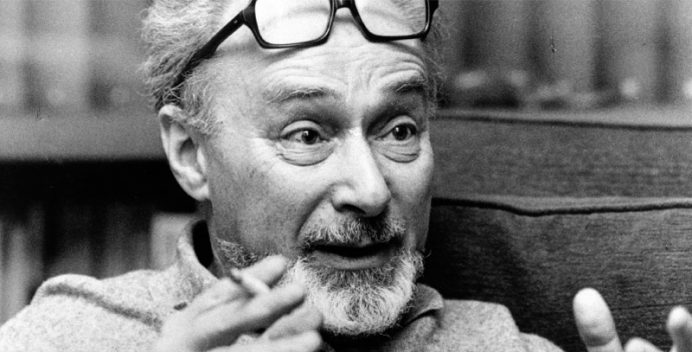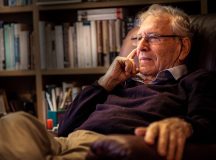Alvin H. Rosenfeld, Director of the Institute for the Study of Contemporary Antisemitism and the Irving M. Glazer Chair in Jewish Studies at Indiana University, pays moving tribute to Primo Levi, the Auschwitz survivor and writer, on the 100th anniversary of his birth. Rosenfeld takes issue with Judith Butler and other neo-diasporists who have used some of Levi’s dissenting remarks against Israel’s military moves in Lebanon to enlist his voice in the cause of ‘anti-Zionism’. Rosenfeld shows that Butler quotes Levi selectively and ignores other things he had to say about Israel, ‘a State founded for those who were with me in the camps’. The author of If This Is A Man, insisted that ‘the idea that Israel might someday be destroyed’ was ‘unacceptable’.
Every age has its share of volatility, but ours, beset by escalating violence on a global scale, including a resurgence of hostility against Jews and the Jewish state, seems especially overwrought and is badly in need of calming down. For that to happen, sober-minded, sagacious people need to be heard from, but they are in short supply right now. In search of such clarifying voices, one is tempted to call up figures from the past, including a recent and much more violent past. One can hardly do better than to look to Primo Levi.[1] This year marks the centenary of his birth, so it is a fitting time to recall some of the special features of his life and achievements and also reflect on his relevance for our own day.
Levi was born in Turin, Italy in 1919 into a middle-class, largely assimilated Jewish family and trained as a chemist. The analytical skills he developed in his scientific studies remained with him throughout his life and were integral to how his mind worked. But what shaped him most of all and turned him into the important writer he became, and also into a more fully conscious and committed Jew, were events well beyond his control. In the very year of his birth, the National Socialist Party was established in Germany, and in Italy Mussolini founded the fasci di combattimento (‘fighting bands’). In later years, Levi became a casualty of both of these destructive movements. Arrested as a member of a partisan group in late 1943, he was sent first to an Italian transit camp in Fossoli and soon afterwards to Auschwitz, specifically Auschwitz-Monowitz (or Buna), where he remained for almost a full year. By his own admission, ‘If it hadn’t been for the racial laws and the concentration camp, I’d probably no longer be a Jew, except for my last name. Instead, this dual experience, the racial laws and the concentration camp, stamped me the way you stamp a steel plate. At this point, I’m a Jew, they’ve sewn the Star of David on me, and not only on my clothes.’ [2]
Being defined as a Jew under these conditions meant, for Levi, becoming a witness, a vocation that found its most meaningful and lasting expression in his becoming a writer. In his own words: if not for Auschwitz, ‘I probably would not have written anything. I would have had no motivation, no incentive to write … it was the experience of the Lager that forced me to write.’[3]
As one of the most deeply thoughtful writers about the Holocaust, Levi is today deservedly regarded as an indispensable guide to the atrocious reality of life and death in the Nazi camps.
The Third Reich’s camp system was vast, numbering some 40,000 or more sites of transit, incarceration, slave labor, prisons, brothels, ghettos, and more. Among the murder camps, Auschwitz was the most notorious — the largest single site of mass killing in human history. Of the approximately 1.1 million people murdered there, some 90 per cent were Jews. Levi’s first book, Se questo ѐ un uomo [known in its first English translation as If This Is a Man (1959) and, in its first American publication, as Survival in Auschwitz (1961)], chronicles what is left of the human condition after virtually everything essential to it is stripped away: ‘Nothing belongs to us anymore; they have taken away our clothes, our shoes … even our hair; if we speak, they will not listen to us, and if they listened, they would not understand. They will take away even our name; and if we want to keep it, we will need to find in ourselves the strength to do so, to manage somehow so that behind the name something of us, of us as we were, remains.’ [4]
Survival in Auschwitz is an unusually perceptive account of such human reduction — of ‘life on the bottom’[5] — and of what it took to endure such radical deprivation and still retain some semblance of humanity. The conditions were radically dehumanising and physically depleting, and many of the camp inmates perished. Levi was fortunate and survived. His memoir, a detailed and sober exposition of all he witnessed, is a moral and literary achievement of the highest order.
Some 15 books and innumerable essays, short stories, poems, reviews, and interviews followed, many of them extending Levi’s reflections on Nazism’s exaltation of violence and the human destruction it wrought. He regarded the creation of the camps as ‘the greatest crime in the history of humanity,’[6] and, until the end of his life, he remained devoted to illuminating ‘what man’s presumption made of man in Auschwitz’. The enormity of the Nazi slaughter defied understanding to most of those who witnessed it, but Levi never gave up probing its madness and cruelty and managed to write about it with astonishing calmness and clarity. While he focused on human misery, his voice remained typically tempered, and his prose was marked by lucidity, subtlety, concision, and a restrained and somber elegance. Restraint in Levi’s case, though, does not imply coldness or emotional distance. On the contrary, to read him is to encounter always an intellectually vibrant and engaging mind, one searching to get to the essence of what mattered most.
His first book was a personal account of the pervasive absurdities, humiliations, and endless degradation of daily life in Auschwitz. His final book, Sommersi e i salvati, (1986), known in English as The Drowned and the Saved (1988), is a collection of finely-wrought essayistic reflections on the evil character and lasting consequences of Nazi terror. As he understood his role as a writer-witness, his obligation was to preserve ‘the memory of the offense’[7] and try to make sense of it all. No one has done it better. After some 40 years of documenting and pondering ‘the central event, the scourge of [the 20th] century,’[8] he summed up what he had learned in the last pages of his last book: ‘It happened, therefore it can happen again: this is the core of what we have to say.’ [9] Elsewhere, he added, ‘Consciences can again be seduced and obscured: even our own.’[10]
Primo Levi Today
Levi is no longer with us: he died in 1987, possibly by suicide. His words remain, a matchless record of testimony and reflection from a writer who grappled with a tormented past throughout the 40 years of his post-Auschwitz existence. In addition to all one learns from Levi about the range of Nazi atrocities, his writings are also important as a warning about what might lie ahead. To read him in the present moment, in fact, is not only to be reminded of human behaviour at its worst but also to see that the malign forces that brought about his suffering and that of countless others are far from spent. The threats to human decency, dignity, and life itself that Levi contended with have hardly faded. On the contrary, in manifold ways, including a revived and increasingly menacing antisemitism, they are a prominent and threatening part of present-day reality in numerous countries.
In speeches and short articles that Levi periodically wrote for Italian newspapers, he reiterated his belief that, while fascism had been defeated in World War II, the social, political, and ideological forces that gave birth to it were capable of reviving. Indeed, as he looked about him, he realised it was an illusion to believe that fascism had vanished like a bad dream: ‘Fascism was far from dead; it was only hidden, encysted. It was molting and would reappear in a new guise.’ [11] Its post-war manifestations took on familiar forms: the ascendancy of strong, charismatic, and potentially tyrannical leaders, efforts in various countries to curtail individual freedoms, the censoring and distortion of news and other forms of information, the corruption of justice, a revival of religious and political fanaticism, ideological subversions of education, the denigration of specific groups deemed to be alien or inferior, and the propagation of nostalgic yearnings for a supposedly better, more orderly world gone by, which might be reclaimed through newly energised populist and nationalist movements.
Accompanying these tendencies, all of which are observable today, was a revival of antisemitism. Levi accounted for its return and the dangers it once again posed on the basis of two growing factors, both of which likewise have a contemporary presence: a desire on the part of many to minimise, deny, or simply forget the reality of the murder camps; and a stridently demonising equation of Jews, Zionism, and Israel with Nazism.
In an effort to counter such defamatory and destructive trends, Levi held firmly to a commitment to memory: ‘We must not forget, we must not be silent. If we are silent, who will speak? Certainly not the guilty and their accomplices. If our testimony is missing, in a not distant future the deeds of Nazi bestiality … will be relegated to legend.’ [12] He recognised, to his dismay, that such a process of dehistoricising the past was already underway. Within the short space of a decade following the defeat of Nazi Germany, Levi observed that the will to forget or deny was actively challenging the necessity to remember: ‘The subject of the extermination camps … is starting to be completely forgotten.’ [13] The stakes in the struggle between remembering and forgetting were high: ‘If the world could be convinced that Auschwitz did not exist, it would be easier to build a second Auschwitz.’[14]
To prevent the worst of what he had endured from recurring, Levi remained faithful to the imperatives of memory, even as he realised that the tenacity of memory was apt to be challenged by the erosions of time and, more perniciously, by the determined work of willful deniers. He addressed the former extensively and in careful, nuanced ways in some of the most insightful chapters of his last book, where he spoke up for the importance of personal memory, even as he acknowledged its sometimes drifting nature. As for those who intentionally minimised, distorted, or outright denied the realities of the Nazi past, Levi called them memory ‘manipulators,’ or, to cite his own potent coinage, ‘dismemberers’. They included prominent Nazi figures like Adolf Eichmann, Rudolph Höss, and Albert Speer, and French apologists for Nazism like Louis Darquier de Pellepoix and Robert Faurisson, who called the genocide of the Jews a ‘hoax’ and ‘nothing but Jewish lies’. Levi understood that such a falsification of memory was equivalent to a falsification of reality itself, and he went after the falsifiers fiercely. He did so in the conviction that failure to keep alive credible knowledge of the Nazi crimes was itself a crime against historical truth and would lead to a corruption of conscience, judgement, and civic responsibility. Were that to happen, ‘A second Hitler could be born, maybe already has been born …. Auschwitz can be repeated.’ [15]
Antisemitism and Anti-Zionism
In Levi’s lifetime and, thus far, in our own, a second Hitler is yet to make an appearance. The same cannot be said for antisemitism, which has been on the rise over the past two decades and was, once again, a troublesome presence in Levi’s day. Historically, Italian antisemitism did not pose as pervasive and brutal a threat as French or German antisemitism, but social prejudice against Jews was a fact of life for many. Levi’s recollections from childhood attest to his being picked on and made fun of by his non-Jewish schoolmates, although he was never physically attacked. Similar occurrences were part of his university experience, when he felt shunned and isolated by his fellow students. In the 1930s, Italian Jews were often portrayed as Zionists and, as such, suspected of having divided national loyalties. In fascist circles, there was a serious questioning of their identity and patriotism, and they were sometimes condemned as being less than ‘true’ or ‘genuine’ Italians. The passage of the Italian racial laws in the fall of 1938 intensified anti-Jewish attitudes and made things still more tense for the country’s Jews. The fascist press added to the climate of suspicion and hostility by launching an anti-Zionist campaign, which featured slogans like ‘anti-fascist equals anti-patriot, equals Zionist, equals Jew,’ and ‘Anyone who calls himself a Zionist has no right to honour or profits in our country.’[16]
Anti-Jewish animosity, frequently assuming the form of anti-Zionism, continued episodically within Italy in the postwar period, especially during the 1970s and 1980s. During a 1979 basketball game between an Italian team and a visiting Israeli team, Maccabi Tel Aviv, a chant went up among those rooting for the Italian players: ‘Ten, a hundred, a thousand Mauthhausens!’ Levi called such fans ‘idiots’ and added that neo-Nazism or neo-antisemitism is finding new recruits among them.[17] Much worse, in October, 1982, Rome’s main synagogue was bombed by Palestinian terrorists, probably led by Abu Nidal. One child was killed and 37 people wounded. Levi wasted no time in denouncing it.
What gripped him most of all about the reappearance of antisemitism in the postwar years was a heightening of hostile attitudes toward Israel. Levi did not grow up as a Zionist; nor did he have the kind of early religious education that might have connected him personally to ancestral Jewish yearnings for a return to the land of the Jewish people’s birth. Much of his knowledge about Judaism and the Jews, in fact, was a result of his exposure to Jews from eastern Europe whose culture he encountered for the first time in Auschwitz. If, as he claimed, the camp was his ‘real university,’[18] in some ways it was also his yeshiva. As his friend Dan Vittorio Segre noted, Levi ‘was a stranger to Jewish culture …. he had landed on a Jewish planet in Auschwitz with no preparation and no Jewish upbringing, like many Italian Jews.’[19] Some 90-95 per cent of the camp’s inmates during Levi’s time there were Jews, the great majority of them Ashkenazim from Eastern Europe. It was from them that Levi first heard Yiddish and also learned some of the fundamentals of Judaism. He learned still more through his many chance encounters with Jews in Poland, Russia, Hungary, and Romania during his lengthy, circuitous return to Italy following his liberation from the Lager.
Thanks to these experiences, recounted in La Tregua (The Truce, 1963), Levi first came to know young Zionists and was fascinated by them, so much so that he devoted an entire novel, Se non ora, quando? (If Not Now, When?) to telling their story. His narrative follows the exploits and wanderings of a small group of young Jewish partisans, who during the war lived in the forests and fought the Nazis and their allies. Following war’s end, they were determined to get away ‘from this Europe of graves’ and make their way to the Land of Israel, where they would be ‘men among men’ and work to reclaim ‘the honour of our submerged people’. [20]
Israel
Levi was clearly inspired by them, but not enough to follow their example and join his fate in the postwar period to the Zionist project in Israel. He had a complicated relationship to the country. He visited it only once, in March, 1968, with a group of 40 former partisans from Italy. Beyond this brief stay, he had no personal contact with Israel and did not know it well. He maintained contact with several Italian Jewish friends who were Zionists and who had settled in the land. Like other Jews, Levi kept up with news from the region, especially during times of crisis. His responses to two of these crises reveal a strong attachment to Israel on a personal level but also some sharp differences with the country’s policies, especially under the rule of Menachem Begin.
His criticisms were political and generally lined up with the views of the Italian Left. They came to a head in 1982, during Israel’s incursion into Lebanon in Operation ‘Peace for Galilee’. Originally meant as a response to Palestine Liberation Organisaton (PLO) threats against Israeli communities in the north, the war widened to the point of Israeli forces reaching as far as Beirut and remaining in Lebanon for three years (June 1982-June 1985). Much of public opinion in Western countries, including Italy, turned against Israel, especially following the Christian Phalange militia’s massacre of Palestinians in Sabra and Shatila in September, 1982. Levi joined his voice to the protests, signing letters urging Israel’s withdrawal and calling for Begin’s retirement from office. In turn, he himself came under criticism from prominent leaders of the Italian Jewish community, who called for communal solidarity at such a time. Fearing an intensification of hostility against Jews in Italy as a result of vehement anti-Israel and antisemitic demonstrations breaking out across Europe, they also thought it unwise for Jews to join their voices in protest against Israel, as Levi and others were doing. Levi’s Italian Jewish friends living in Israel, some of whom lost family members in the country’s War of Independence and subsequent fighting, also spoke out against him.
Levi became uneasy as a result of these disputes, which put his existential attachments to Israel at odds with his criticism of some of its policies. ‘I retain a close sentimental tie with Israel,’ he confessed at the time, ‘but not with this Israel’. [21] In the end, he had enough of partisan political bickering over the Jewish state and backed off from further public comments.
Judith Butler and others have used some of Levi’s dissenting remarks against Israel’s military moves in Lebanon to enlist his voice in making a strong case against Zionism and on behalf of diasporic Jewish existence.[22] But in waging her polemical campaign against the Jewish state, Butler quotes Levi selectively and ignores other things he had to say about Israel. To gauge a fuller extent of his convictions at their deepest, it is worth recalling important statements that Levi made during an earlier and still more critical moment in Israel’s history.
Following the threats it fought off during the 1948 War of Independence, the young state’s most perilous challenge next came in the run-up to the war of June, 1967. Egypt’s Nasser publicly announced that the Arab national aim in the coming war was nothing short of Israel’s annihilation. The goal, he repeatedly and triumphantly proclaimed, was to ‘drive the Jews into the sea,’ an end endorsed by his military allies and sanctioned by Muslim religious leaders.
In the face of these militant threats, anxiety ran high among Jews throughout the world. On 31 May 1967, just days before the outbreak of what came to be called the Six-Days War, Levi gave a speech in the main synagogue of Turin, his native city, which was soon after published under the title ‘More than Any Other Country Israel Must Live’.[23] The following words set the tone and direction of the speech and clearly expressed what mattered most to Levi: ‘He began by decrying the religious character of the declared Arab war aims: … Lately words have been [expressed] that we thought were extinct. The language is absurd and savage, not new: “With the help of God, we will win and we will exterminate our enemy.” I can’t imagine a worse blasphemy … This is worse than taking [God’s] name in vain — it is calling for his help in a massacre. Are there still people in this world who believe in holy war and equate it with total war?’
Levi went on to remind everyone that Israel, a small country ‘originating in persecution and massacre,’ is meant to be a guarantee that ‘there will be no more persecutions, no more massacres’. No other country, he continued, is asked ‘to cease to exist,’ but precisely such an end was being envisioned for Israel. Moreover, with Egypt in the lead, several Arab armies were preparing for the country’s liquidation. Levi’s response was that Israel ‘must survive.’ Why? Because, like every other country, ‘it has the right to live,’ but, beyond this reason, ‘Everyone should remember that the generation that created Israel consists almost entirely of people who escaped the massacre of Judaism in Europe … The pioneers of Zionism are the survivors of the tsarist pogroms, of the ghettos, of the mass graves, of Hitler’s Lagers. For this reason, I say, Israel is not like other countries; it is a country to which the whole world is indebted, it is a country of witnesses and martyrs, of the insurgents of Warsaw, of Sobibór, and of Treblinka … The goal of inflicting dispersion and massacre on the survivors of dispersion and massacre is doubly criminal.’
Himself a witness to the anti-Jewish massacres in Europe, it is no surprise that Levi saw ‘the relationship of every Jew, even if he is not a Zionist, to the State of Israel [as] obvious and profound’. Whatever his later differences with Israeli policies, his existential connection to the country was made emphatically clear: ‘Israel must live,’ he twice reiterated in his Turin synagogue speech. Policy differences could be discussed and disputed, but there could be no denying the Jewish state’s right to continued existence.
And yet, this very right remains under attack today. Alone among the world’s nations, Israel and Israel alone is the target of frequent and impassioned calls for its liquidation. It is true that Nasser is long since gone, and Egypt’s current leader shows no interest in another war with the Jewish state. The same is true of the leaders of Jordan, the Gulf states, and, for now, Iraq. One hears hateful, belligerent words from Iran and from non-state actors like Hezbollah, Hamas, Islamic Jihad, and others. A new war emanating from any or all of the latter is a possibility, perhaps even in the near term. One can already foresee what is likely to emerge if such a military conflict ensues. The fighting will be accompanied by a relentless propaganda war against Israel from numerous ideological and political circles in Western countries and parts of the Muslim world. The language of jihad, or holy war, will be loudly heard, as will be accusations against Israel for using ‘disproportionate force’ and ‘violating the norms of international law’. Israel will be denounced as a ‘criminal state,’ guilty of gross ‘acts of injustice,’ including ‘apartheid,’ ‘ethnic cleansing,’ and even ‘genocide’. Its fiercest adversaries will excoriate the Jewish state for its ‘racism,’ ‘human rights abuses,’ ‘imperialism,’ and ‘settler-colonialism’. To reduce it to the status of a pariah state, they will compare it to apartheid South Africa and Nazi Germany. These are all predictable rhetorical strategies spelled out in the anti-Israel playbook and will be prominently featured in both conventional and social media. In addition, anti-Israel demonstrations in major cities and on college campuses will likely be accompanied by a reenergised and more aggressive antisemitism. In short, things will turn ugly. As a result of widespread, ongoing efforts to demonise and delegitimise the Jewish State, often using the very same terms just cited, they are already ugly. Factor in as well repeated calls for Israel’s destruction emanating from the ayatollahs and Revolutionary Guards of Iran and the leaders of Hizbullah in Beirut and Muslim Brotherhood groups in Gaza and elsewhere, and the picture becomes still more ominous.
This situation is, unfortunately, not new, and there is no need to ask how Primo Levi would respond to it, for we already know:
My relationship with that land is out of the ordinary, for emotional and personal reasons. It is a State founded for those who were with me in the camps. A country of old companions, people who are dear to me … for me, it is an unacceptable thought, the idea that Israel might someday be destroyed.[24]
It should be an unacceptable thought for all. Instead, such thinking has become normative in certain left-wing and right-wing political circles, as well as within much of Muslim public opinion. Milder versions of it also show up within segments of mainstream opinion, where the idea of Israel’s dissolution or disappearance is no longer regarded as scandalous. Levi himself would surely have seen it in those terms, for at the heart of his thinking was the insistence that ‘humanity will be one, or it will not be’.[25] To exclude the Jews and the Jewish state from common humanity was out of the question to him. From his time in Auschwitz he knew the ultimate goal of such exclusion: the demolition of human essence itself, especially for those guilty of the sin of being born Jewish.
Might such a destructive fate now be visited upon the Jewish state? If Auschwitz were to be repeated, would it take place this time not in Europe but in the Mediterranean?
There can be only one decent reply to these questions. Levi’s affirmation that ‘Israel must live’ was an existential imperative in his day. Among civilised people everywhere, it should remain so.
References
[1] For readers who wish to learn more about the life and writings of Primo Levi, four well-researched and fairly comprehensive biographies are available in English: Robert S. C. Gordon, Primo Levi’s Ordinary Virtues: From Testimony to Ethics (Oxford: Oxford University Press, 2001); Myriam Anissimov, Primo Levi: Tragedy of an Optimist (New York: The Overlook Press, 1999), Ian Thomson, Primo Levi: A Life (New York, Metropolitan Books, 1992), and Carole Angier, The Double Bond: Primo Levi, a Biography (New York, Farrar, Strauss, Giroux, 2002).
[2] Ferdinando Camon, Conversations with Primo Levi (Marlboro, Vermont: The Marlboro Press, 1989), p. 68.
[3] The Complete Works of Primo Levi, edited by Ann Goldstein, 3 volumes (New York: Liveright Publishing Corporation, 2015), p. 192.
[4] Survival in Auschwitz (New York: Collier Books, 1993), p.27.
[6] The Drowned and the Saved (New York: Vintage Books, 1989), 14.
[7] These words make up the title of first chapter of The Drowned and the Saved.
[10] The Complete Works of Primo Levi, p. 190.
[16] Myriam Anissimov, Primo Levi: Tragedy of an Optimist, p.45.
[20] If Not Now, When?, translated by William Weaver (New York, Summit Books, pp. 168-69).
[21] Myriam Anissimov, Primo Levi: Tragedy of an Optimist, p.349.
[22] Judith Butler, Parting Ways: Jewishness and the Critique of Zionism (New York: Columbia University Press, 2014), pp. 181-204. For a critique of Butler’s use of Levi, see Cary Nelson, Israel Denial: Anti-Zionism, Anti-Semitism, & The Faculty Campaign Against the Jewish State (Bloomington: Indiana University Press, 2019), pp. 68-116. Pankaj Mishra , the Indian essayist and novelist, also recently enlisted Levi to make a case against Israel. For a critique of Mishra in this respect, see Liel Leibovitz, https://www.tabletmag.com/jewish-arts-and-culture/287590/pankaj-mishras-moral-mish-mash.
[23] For the text of this speech, ‘More Than Any other Country Israel Must Live,’ see The Complete Works of Primo Levi, pp. 1181-85. All quotations are taken from this speech.
[24] Myriam Anissimov, Primo Levi: Tragedy of an Optimist, p.345.
[25] The Complete Works of Primo Levi, p. 1184.






































Any concept of the physical destruction of Israel by any means would be an unprecedented crime in all history, including the Holocaust. But such an existential threat does not exist in spite of propagandist exhortations from Israel’s enemies.
But there is the question of what geographical territory legitimately constitutes ‘Israel’? Israel does not have the moral or legal right , in isolation, to determine the answer to that question.
Primo Levi may have had even more conflicting thoughts about Israel and Zionism if he had had access to the historical information we now readily have about the origins and evolution of the Israel/Palestine conflict and it’s basis in Zionist interpretations.